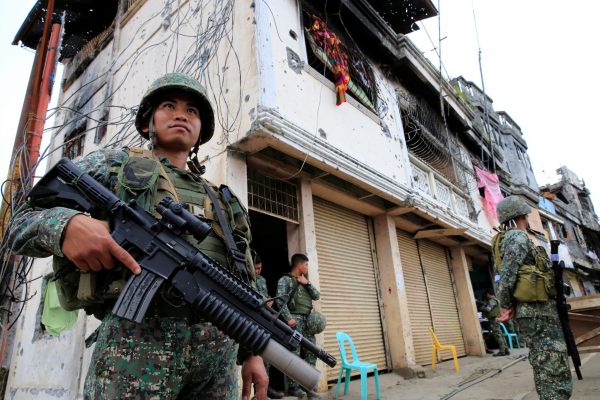On 30 November 2016, a rightist group calling itself the Democratic Front for Filipinism (DFF) staged rallies in major urban centres to press Duterte to declare a revolutionary government aimed at overhauling the configuration of power in the country. The group could have taken cues from Duterte himself, who once threatened to declare a revolutionary government should opposition groups continue their alleged destabilisation plots. The mobilisation of the DFF indicates a nascent movement of diehard supporters ready to defend the President against any ‘threats’.
But these threats are more imagined than real: over the course of the year, Duterte has effectively silenced his critics and those who he believes stand in his way. His most vocal critic, Senator Leila de Lima, was arrested in late February for alleged involvement in the illegal drug trade. The incumbent chief justice of the Supreme Court, whom Duterte labels as corrupt, is facing an impeachment complaint in the lower house — a complaint that may sail given the supermajority allied with Duterte. The President has also vilified the chair of the country’s human rights commission by insinuating that he is ‘gay or a paedophile’.
Duterte has reserved the vilest statements for his foreign critics. He has threatened to slap the United Nations Special Rapporteur Agnes Callamard if she investigates him for alleged extra-judicial killings. He has threatened to expel European Union diplomats after suggestions that tighter trade restrictions be imposed on the Philippines in view of its human rights record. Clearly, the actions and pronouncements of Duterte show that he is someone who is willing to do anything and everything to eliminate his opponents.
The chief criticisms against Duterte revolve around the thousands of casualties from the drug war that he has waged since assuming the presidency. In view of a number of controversies, Duterte see-sawed on the anti-drug campaign in 2017. He suspended it in February after the involvement of police officers in the kidnapping and killing of a South Korean national, but then resumed the war less than two months later, transferring the operations from the police to the Drug Enforcement Agency when his satisfaction ratings dipped in September. He has indicated the possibility of once again tasking the police as the primary agency to wage a war that he himself now claims can’t be won within his term.
The latter statement testifies not only to the delusion that Duterte harboured when he vowed to eradicate the proliferation of illegal drugs within the first six months of his presidency but more importantly testifies to his simplistic assessment of the ails of the nation and what it takes to address these woes.
Duterte’s naivete was also exemplified by his earlier appraisal of armed groups in the Southern Philippines as nationalists rather than criminals and by his disavowal of a military offensive against them, believing this would drive them to desperation. In late May, Duterte’s appraisal was proven to be mistaken when the pro-ISIS Maute Group engaged the military as it pursued the group’s leader in Marawi City.
Amid the raging conflict, Duterte declared martial law in the entire island of Mindanao. A week into the conflict, Duterte was furious: he rejected the option of a peace talk and vowed to annihilate every member of the Maute group. The conflict raged for five months causing the displacement of hundreds of thousands of Marawi residents and the deaths of more than 150 soldiers and around 50 civilians.
Duterte’s pompous behaviour masks his coltishness. Although he once vowed to jet ski to a disputed South China Sea island to assert Philippine sovereignty, Duterte has sustained a conciliatory posture towards China despite the latter’s continuous militarisation in the disputed islands. In meetings with Chinese President Xi Jinping and Premier Li Keqiang, Duterte has favoured an expansion of trade and investment relations. As Chair of the Association of Southeast Asian Nations in 2017, the Philippines did not push for a stronger position on China’s continuous build up: the ASEAN Chair’s statement in April 2017 simply took ‘note of concerns expressed by some leaders over recent developments in the area’.
The bright side comes from the economic front, with the economy’s 6.9 per cent expansion in the third quarter of the year beating predictions. Multilateral institutions project that this growth rate will be sustained in the next couple of years given expansionary fiscal policy and broad-based expansion in domestic demand. For Duterte, the economy’s continuous growth translates to a sustained improvement in the quality of life for many Filipinos: a condition that is known to maintain the public’s appreciation of government.
For his critics, the possible sustenance of the public’s approval and trust in Duterte may be the most disquieting prospect to come in 2018.
Ronnie Holmes is President of Pulse Asia, a public opinion research firm, and is a PhD candidate at the Department of Political and Social Change at the Coral Bell School of Asia Pacific Affairs, The Australian National University.
This article is part of an EAF special feature series on 2017 in review and the year ahead.

